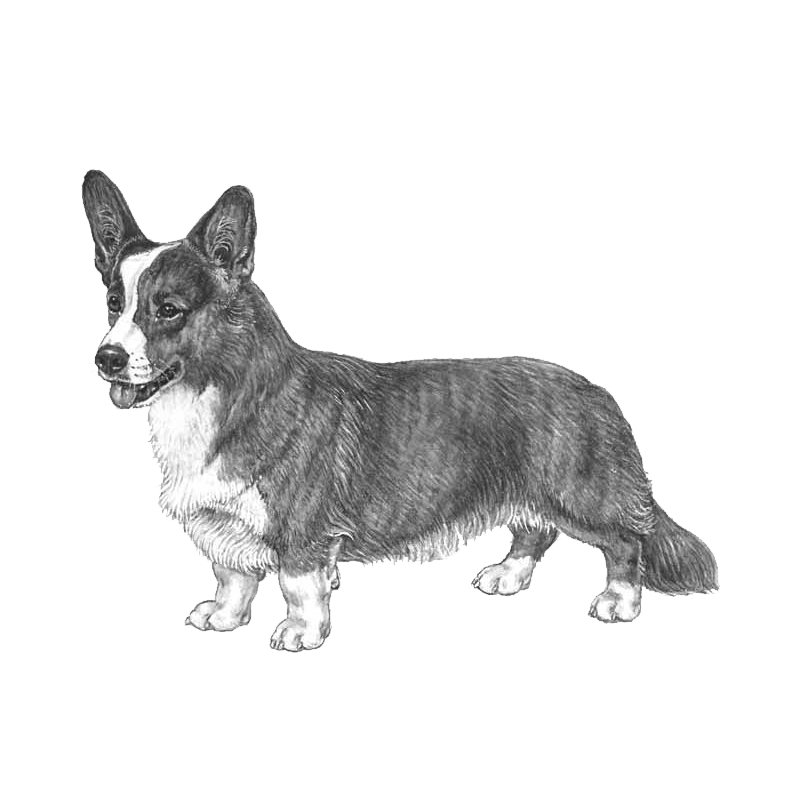Cardigan Welsh Corgi

Welsh Corgis have historically been used as herding dogs, specifically for cattle. They are of the type of herding dog referred to as "heelers", meaning that they would nip at the heels of the larger animals to keep them on the move. Both Pembrokeshire and Cardigan are historically agricultural areas of Wales.
Source: https://en.wikipedia.org/wiki/Welsh_Corgi
The two Corgi breeds are named for those regions. Once interbred, the Kennel Club designated the different types as two distinct breeds in 1934. The Cardigan Welsh Corgi breed is listed by the Kennel Club in the current vulnerable breeds list. The breed is ranked by AKC at #68 of 195.
Source: https://www.thekennelclub.org.uk/search/breeds-a-to-z/breeds/pastoral/welsh-corgi-cardigan/
Also see: Pembroke Welsh Corgi https://dogwellnet.com/breeds/pedigreed/pembroke-welsh-corgi-r221/
Links to Breed Descriptions
Illustrated Standard: CWCCA: https://cardigancorgis.com/cwcca/breed/illustrated-standard/
Other Names for Breed
Welsh Corgi Cardigan
Country of Origin and Parent Breed Club
Great Britain (Wales)
Breed-Specific Articles
 Get a GRIHP! on Welsh Corgis
Get a GRIHP! on Welsh Corgis
This article on Welsh Corgis is part of a series to highlight the Big Picture of health, welfare and breeding and to help develop Globally Relevant Integrated Health Profiles (GRIHPs) for many breeds. See IPFD's Get a GRIHP! on Breed Health Initiative.
Comments on the corgi breeds by Aimee Llewellyn, Manager of HGTD and owner of corgis...
Quote
Genetic Testing and the Welsh Corgis.
Generally speaking the Cardigan and Pembroke Welsh Corgi breeds are considered a lower risk for known inherited diseases. Currently on HGTD, you can see that there are 8 disease-related tests (Cardigan LINK, Pembroke LINK) offered, and a few tests related to aesthetics such as coat colour/length. Of the disease-related tests, most of the tests are quite rarely seen clinically in the breed (with the exception of Chondrodysplasia – the “Short” mutation!). Looking at Breed Club advice, it is interesting to note how different the genetic testing recommendations are around the world. In the US, for example, only degenerative myelopathy (DM) testing is mentioned in the health information from the Pembroke Welsh Corgi Club of America (www.pwcca.org), but there are a number of clinical examinations (eyes, hips, etc.) that are considered very important. Looking at the UK, The Kennel Club’s Assured Breeder Scheme (www.thekennelclub.org) mentions the DNA test Progressive Retinal Atrophy rcd-3, but not DM. Does this mean that different corgi populations are experiencing different risks? Or just prioritizing different testing? It is hard to know, as there is research out there discussing how many breeds have different health priorities based on their country/location, but clearly there are some aspects of the corgi that remain the same – like their short stature (Chondrodysplasia).
For breeders, most consistent recommendations from international breeding advisors – such as breed and kennel clubs - focus on advising to breed for good temperament, sound conformation, and eye testing – both clinical examinations, and DNA tests.
In my personal experience as a Pembroke corgi owner since childhood, they are far more likely to be at risk for the common challenges for all dogs – temperament, and obesity if you get a real foodie. Personally, I believe genetic testing for these breeds is a very valuable tool in the breeder’s toolbox, but it is even more important to always breed for whole dog health – temperament, sound conformation, low-risk genetic test results, breed diversity, and ultimately a dog you want to live with and enjoy for their fairly long lives.
Note: I write this with my own sweet boy, MacDuff (Duffy) resting his head on my feet, so I admit to some bias!
Breed Standards
There are numerous breed standards. The basis of breed/conformation shows is the judging of pedigree dogs against the 'Breed Standard', which is a picture in words that describes the range of features that are deemed appropriate for the breed. Three of the major international standards are:
FCI (Federation Cynologique Internationale)
Breed-Specific Statistics
1. Swedish Insurance Data Breed-specific information on rates of disease and death from Agria Pet Insurance (Agria Djurförsäkring) is available for many breeds. This breed has information on Veterinary Care and Life Insurance. Click here to view downloads
2. Finland: Koiranet DB: Cardigan: http://jalostus.kennelliitto.fi/frmTerveys.aspx?R=38&Lang=fi
Breeding/Health Strategy Documents
Health/Breeding Strategy Documents and Links:
UK: The Kennel Club: Breed Watch (Category 1)
Denmark: Health Testing Requirements (Danish): https://www.hundeweb.dk/dkk/public/openPage/tjenester/avlsrestriksjoner/raseData.html?RAID=0380
Norway: Rasespesifikk avlsstrategi (RAS): http://www.corgi.no/wps/wp-content/uploads/2021/01/RAS-siste-2.docx
Finland: RAS: https://jalostus.kennelliitto.fi/RotuPDF.ashx?R=38&T=2
PEVISA: https://www.corgiseura.net/jalostus/pevisa/
Koiranet DB: Cardigan: http://jalostus.kennelliitto.fi/frmTerveys.aspx?R=38&Lang=fi
Sweden: RAS: https://www.skk.se/globalassets/dokument/rasdokument/ras-welsh-corgi-cardigan.pdf
France: Cotation: http://www.welshcorgi.fr/le-club/documents-utiles/demande-de-cotation
Netherlands: Generations & Health Online database: Search Database by NHSB number, name or chip number. The Generations & Health Online database contains the data of dogs registered in the Dutch Dog Studbook (NHSB) born in or after 1997.
US: CHIC: https://www.ofa.org/recommended-tests?breed=WCC
Health Surveys
OFA Health Survey: https://www.ofa.org/about/educational-resources/health-surveys#api_summary
UK/KC 2004: welsh corgi cardigan.pdf
126 Cardigan Welsh Corgi registered by the Kennel Club in 2019: See KC stats at: https://www.thekennelclub.org.uk/media-centre/breed-registration-statistics/
Breed-Specific DNA Tests
Other Breed-Specific Webpages
Cardigan Commentary International
This site is now kept by CWCCA: it contains many resources and articles. Well worth a visit!
Cardigan Welsh Corgi Health Foundation, Inc.
The Cardigan Archives: http://www.cardiped.net/index.php
* * 3-4-2022: We currently have 44121 dogs in the database and 2381 registered users* *
Articles
Canine Chronicle: Breed Priorities: Cardigan Welsh Corgi: https://caninechronicle.com/current-articles/breed-priorities-cardigan-welsh-corgi/
Country Life (UK): Cardigan Welsh Corgis: ‘Smashing little dogs’ which deserve as much recognition as their Pembroke cousins: https://www.countrylife.co.uk/out-and-about/dogs/cardigan-welsh-corgis-smashing-little-dogs-deserve-much-recognition-pembroke-cousins-202519
ShowSight: The Cardigan Welsh Corgi (CWCCA): https://showsightmagazine.com/the-cardigan-welsh-corgi/
Canis Major: Welsh Corgis: Small Dogs With Big Dog Hearts: http://www.canismajor.com/dog/corgi.html
Breed Clubs
We are listing sites for breed clubs with health or other information that might be helpful. Follow links below.
US: Cardigan Welsh Corgi Club of America https://cardigancorgis.com/cwcca/
Check out this club's resources page... https://cardigancorgis.com/cwcca/education/resources/
Canada: Canadian Cardigan Corgi Club: https://cardigancorgi.ca/
UK: Cardigan Welsh Corgi Association: https://cardiganwelshcorgiassoc.co.uk/
Denmark: Welsh Corgi Klubben: https://www.corgi.dk/
Norway: The Norwegian Welsh Corgi Club: http://www.corgi.no/
Finland: Suomen Welsh Corgi Seura ry: https://www.corgiseura.net/
France: Corgis Club de France: http://www.welshcorgi.fr/
Sweden: Svenska Welsh Corgi Klubben: http://www.swck.org/
Austria: ÖCBH: Österreichischer Club für Britische Hütehunde: https://www.huetehunde.at/welsh-corgi-cardigan
Germany: Club für Britische Hütehunde e.V.: http://www.cfbrh.de/
Netherlands: Welsh Cardigan Club Nederland: https://www.wccn.nl/
Dutch Welsh Corgi Association: https://welshcorgiassociation.com/
Report Entry
 Donate
Donate

Recommended Comments
There are no comments to display.
Join the conversation
You can post now and register later. If you have an account, sign in now to post with your account.
Note: Your post will require moderator approval before it will be visible.